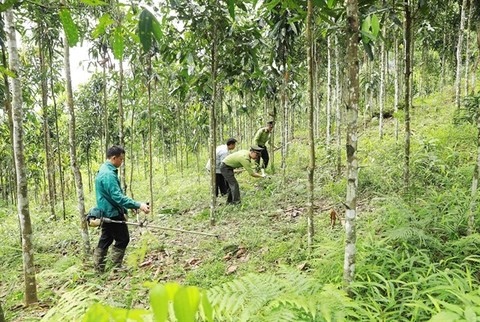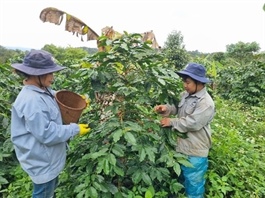Forestry sector falls behind in restructuring
Forestry sector falls behind in restructuring
To date, only 161 agricultural and forestry companies in Việt Nam have completed their restructuring and reforms according to a government-approved plan.

Forestry worker at a forest company in northern Yên Bái Province. The restructuring and reforming the operational model of forestry companies has been slow and has not hit the required timeline. — VNA/VNS Photo |
As many as 95 out of 256 agricultural and forestry companies have yet to complete their restructuring and reform, saysthe latest report by the Ministry of Agriculture and Rural Development (MARD).
After restructuring, many companies have become key players in developing important agricultural and forestry products since their privatisation; however, many have failed to implement their plans.
Head of the Department of Agriculture and Rural Development under the Central Economic Commission, Vũ Mạnh Hùng, noted that 35 management entities oversee 169 originally State-owned forestry companies in the forestry sector.
As of September 2024, only 115 of these companies had completed their restructuring and reforms, leaving 54 still in progress.
He emphasised that the restructuring and reforming of forestry companies has helped address the issue of limited production land for residents, gradually reducing land disputes and complaints related to land, as well as social issues in local communities.
However, restructuring and reforming the operational model of forestry companies has been slow and has not met the required timeline.
He cited numerous difficulties, as companies continued to operate under the old model, with production and business activities facing many challenges due to capital shortages and little progress in the application of science and technology.
The Prime Minister already issued Directive No. 33/CT-TTg on September 10, 2024, to accelerate the process of restructuring, reforming and improving the efficiency of agricultural and forestry companies according to the Party Central Committee’s conclusions.
While Decree No 04/2024/NĐ-CP focused on amending the provisions for converting State-owned forestry companies with one hundred per cent state capital, into joint stock companies, as well as establishing limited liability companies with two or more members, it also specifically regulates the percentage of state capital to be retained in joint stock agricultural and forestry companies that manage large tracts of land.
Hùng said local governments and companies must quickly implement effective solutions to develop and enhance the efficiency of forestry companies.
To manage land effectively and improve the distribution and utilisation of land and forest resources, they should promptly complete land surveys, boundary demarcations and documentation, and issue land use rights certificates based on clearly defined land types and use.
The President of the Việt Nam Association of Agricultural Economics and Rural Development, Hà Công Tuấn, said decentralisation and delegation of authority to provincial-level local governments should be strengthened. This should be accompanied by efforts to improve the operational efficiency of forestry companies.
Deputy director of MARD’s Department of Forestry Triệu Văn Lực said following the restructuring, companies must develop plans for reforming business management and corporate governance. This involves linking the responsibilities of enterprise managers, particularly those in leadership positions, to the performance outcomes of the business, ensuring the preservation and development of state capital.



























